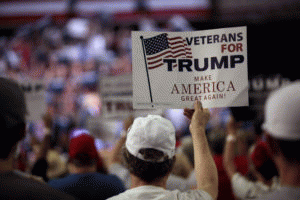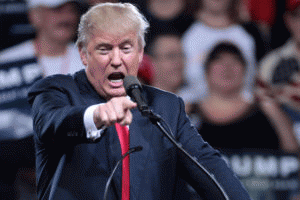From Consortium News

A sign supporting Donald Trump at a rally at Veterans Memorial Coliseum at the Arizona State Fairgrounds in Phoenix, Arizona. June 18, 2016
(Image by (Photo by Gage Skidmore)) Details DMCA
In the end, Hillary Clinton became the face of a corrupt, arrogant and out-of-touch Establishment, while Donald Trump emerged as an almost perfectly imperfect vessel for a populist fury that had bubbled beneath the surface of America.
There is clearly much to fear from a Trump presidency, especially coupled with continued Republican control of Congress. Trump and many Republicans have denied the reality of climate change; they favor more tax cuts for the rich; they want to deregulate Wall Street and other powerful industries -- all policies that helped create the current mess that the United States and much of the world are now in.
Further, Trump's personality is problematic to say the least. He lacks the knowledge and the temperament that one would like to see in a President -- or even in a much less powerful public official. He appealed to racism, misogyny, white supremacy, bigotry toward immigrants and prejudice toward Muslims. He favors torture and wants a giant wall built across America's southern border.
But American voters chose him in part because they felt they needed a blunt instrument to smash the Establishment that has ruled and mis-ruled America for at least the past several decades. It is an Establishment that not only has grabbed for itself almost all the new wealth that the country has produced but has casually sent the U.S. military into wars of choice, as if the lives of working-class soldiers are of little value.
On foreign policy, the Establishment had turned decision-making over to the neoconservatives and their liberal-interventionist sidekicks, a collection of haughty elitists who often subordinated American interests to those of Israel and Saudi Arabia, for political or financial advantage.
The war choices of the neocon/liberal-hawk coalition have been disastrous -- from Iraq to Afghanistan to Libya to Syria to Ukraine -- yet this collection of know-it-alls never experiences accountability. The same people, including the media's armchair warriors and the think-tank "scholars," bounce from one catastrophe to the next with no consequences for their fallacious "group thinks." Most recently, they have ginned up a new costly and dangerous Cold War with Russia.
For all his faults, Trump was one of the few major public figures who dared challenge the "group thinks" on the current hot spots of Syria and Russia. In response, Clinton and many Democrats chose to engage in a crude McCarthyism with Clinton even baiting Trump as Vladimir Putin's "puppet" during the final presidential debate.
It is somewhat remarkable that those tactics failed; that Trump talked about cooperation with Russia, rather than confrontation, and won. Trump's victory could mean that rather than escalating the New Cold War with Russia, there is the possibility of a ratcheting down of tensions.
Repudiating the Neocons
Thus, Trump's victory marks a repudiation of the neocon/liberal-hawk orthodoxy because the New Cold War was largely incubated in neocon/liberal-hawk think tanks, brought to life by like-minded officials in the U.S. State Department, and nourished by propaganda across the mainstream Western media.

Donald Trump speaking with supporters at a campaign rally in Phoenix, Arizona. June 18, 2016.
(Image by (Photo by Gage Skidmore)) Details DMCA
It was the West, not Russia, that provoked the confrontation over Ukraine by helping to install a fiercely anti-Russian regime on Russia's borders. I know the mainstream Western media framed the story as "Russian aggression" but that was always a gross distortion.
There were peaceful ways for settling the internal differences inside Ukraine without violating the democratic process, but U.S. neocons, such as Assistant Secretary of State Victoria Nuland, and wealthy neoliberals, such as financial speculator George Soros, pushed for a putsch that overthrew the elected President Viktor Yanukovych in February 2014.
Putin's response, including his acceptance of Crimea's overwhelming referendum to return to Russia and his support for ethnic Russian rebels in eastern Ukraine opposing the coup regime in Kiev, was a reaction to the West's destabilizing and violent actions. Putin was not the instigator of the troubles.
(Note: You can view every article as one long page if you sign up as an Advocate Member, or higher).





